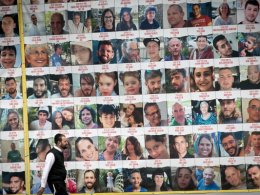Iran hijab protester sentenced to two years in prison
Authorities have sentenced an Iranian woman to two years in prison after alleging she was guilty of “encouraging corruption” for removing her headscarf, Tehran’s judiciary announced Wednesday.
The woman, whose identity is not clear, was arrested during a protest on Tehran's Enghelab Street in December.
Judicial sources in Iran say the woman intends to appeal the verdict and will be eligible for parole after serving three months of her sentence.
Tehran’s chief prosecutor Abbas Jafari Dolatabadi, criticized the sentence for not being harsh enough and promised to impose a full two-year sentence.
Separately, a woman arrested last month after being pushed off a concrete block by Iranian police while protesting the compulsory hijab has been released on bail after posting a bond of nearly 50 million tomans, equivalent to roughly $13,000.
Maryam Shariatmadari was pushed off a concrete block causing her to sustain reported injuries. She was held in Shahr-e Rey prison and denied medical attention, according to those familiar with her case.
Over 35 women have been detained in just capital-city Tehran since December 2017 for breaching compulsory veiling laws, with at least two women facing trial under the new draconian law, according to leading rights group Amnesty International.
Many of the female protestors braved near-certain arrest by removing their headscarves in public while standing on utility boxes and other public platforms and sharing photos and videos of themselves on social media.
In December, a campaign using a hashtag “White Wednesdays” and showing a video of a woman waving a white hijab with her hair loose, resulted in the arrest and subsequent disappearance of one woman, whose fate sparked interest from media and rights groups across the world.
Vida Movahed, a 31-year-old mother of a young child, was arrested December 27 by Iranian authorities after a video of her waving a white hijab on the streets of Tehran went viral ahead of larger protests in the country in the days that followed.
After international condemnation, Movahed was released in late January.
The ongoing anti-hijab protests also coincided with several days of unrest across Iran in December as protestors who were initially angered by Iranian economic policies, quickly moved to express outrage against the theocratic regime in Iran and its policies of funding terror groups abroad over the plight of its own citizens.
Thousands of protesters were arrested and several perished while in detention; deaths the Iranian regime labelled “suicides” but were widely questioned.
Compulsory headscarves have been required in Iran since the 1979 Islamic revolution, with punishments of fines, lashings and even imprisonment for women who do not cover their hair.









